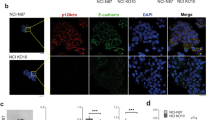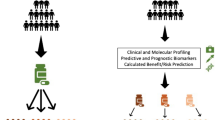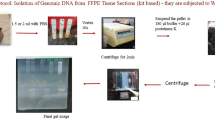Abstract
The genetic basis for gastric and pancreatic cancer is largely undetermined. These cancers are overrepresented in hereditary non polyposis colon cancer (HNPCC), inherited cancer syndrome attributed to germline mutations primarily in the MSH2, MLH1 and MSH6 genes. Among Ashkenazi Jewish HNPCC cases, recurring mutations in the MSH2 (1906G>C; A636P) and MSH6 (c.3984_3987dupGTCA; c.3959_3962delCAAG) genes can be detected. The MSH6*c.3984_3987dupGTCA mutation was recently detected in an Ashkenazi family with inherited gastric cancer. We hypothesized that it may be possible to detect the recurring MSH2 and MSH6 mutations in Jewish individuals with familial and sporadic gastric and pancreatic cancer. To test this notion, we genotyped 143 unrelated Jewish Israeli patients with gastric (n = 23) and pancreatic (n = 120) cancer. The majority of cases (100/143–70%) were Ashkenazi Jews, and 10% (n = 16)—of mixed Ashkenazi-non Ashkenazi Jewish ancestry, and most participants (n = 96–67.1%) had a positive family history of cancer. Genotyping the MSH2*A636P mutation was performed by PCR followed by restriction enzyme digest, and the MSH6*c.3984_3987dupGTCA and c.3959_3962delCAAG mutations were detected by fragment size analysis by capillary electrophoresis and sequencing. None of the participants harbored any of the genotyped MSH2 or MSH6 mutations. We conclude that the recurring Ashkenazi MSH2 and MSH6 mutations contribute little if any to sporadic and familial gastric and pancreatic cases in Israeli patients.
Similar content being viewed by others
References
Schrader K, Huntsman D (2010) Hereditary diffuse gastric cancer. Cancer Treat Res 155:33–63
Hruban RH, Klein AP, Eshleman JR, Axilbund JE, Goggins M (2007) Familial pancreatic cancer: from genes to improved patient care. Expert Rev Gastroenterol Hepatol 1(1):81–88
Slater EP, Langer P, Niemczyk E, Strauch K, Butler J, Habbe N, Neoptolemos JP, Greenhalf W, Bartsch DK (2010) PALB2 mutations in European familial pancreatic cancer families. Clin Genet 78(5):490–494
Stadler ZK, Salo-Mullen E, Patil SM, Pietanza MC, Vijai J, Saloustros E, Hansen NA, Kauff ND, Kurtz RC, Kelsen DP, Offit K, Robson ME (2011) Prevalence of BRCA1 and BRCA2 mutations in Ashkenazi Jewish families with breast and pancreatic cancer. Cancer. doi:10.1002/cncr.26191 [Epub ahead of print]
The Breast Cancer Linkage Consortium (1999) Cancer risks in BRCA2 mutation carriers. J Natl Cancer Inst 91:1310–1316
Jasperson KW, Tuohy TM, Neklason DW, Burt RW (2010) Hereditary and familial colon cancer. Gastroenterology 138(6):2044–2058
Sheng JQ, Chan TL, Chan YW, Huang JS, Chen JG, Zhang MZ, Guo XL, Mu H, Chan AS, Li SR, Yuen ST, Leung SY (2006) Microsatellite instability and novel mismatch repair gene mutations in northern Chinese population with hereditary non-polyposis colorectal cancer. Chin J Dig Dis 7(4):197–205
Lucci-Cordisco E, Rovella V, Carrara S, Percesepe A, Pedroni M, Bellacosa A, Caluseriu O, Forasarig M, Anti M, Neri G, de Leon MP, Viel A, Genuardi M (2001) Mutations of the ‘minor’ mismatch repair gene MSH6 in typical and atypical hereditary non polyposis colorectal cancer. Fam Cancer 1(2):93–99
Banville N, Geraghty R, Fox E, Leahy DT, Green A, Keegan D, Geoghegan J, O’Donoghue D, Hyland J, Sheahan K (2006) Medullary carcinoma of the pancreas in a man with hereditary non polyposis colorectal cancer due to a mutation of the MSH2 mismatch repair gene. Hum Pathol 37(11):1498–1502
Gargiulo S, Torrini M, Ollila S, Nasti S, Pastorino L, Cusano R, Bonelli L, Battistuzzi L, Mastracci L, Bruno W, Savarino V, Sciallero S, Borgonovo G, Nyström M, Bianchi-Scarrà G, Mareni C, Ghiorzo P (2009) Germline MLH1 and MSH2 mutations in Italian pancreatic cancer patients with suspected Lynch syndrome. Fam Cancer 8(4):547–553
Bonadona V, Bonaïti B, Olschwang S, Grandjouan S, Huiart L, Longy M, Guimbaud R, Buecher B, Bignon YJ, Caron O, Colas C, Noguès C, Lejeune-Dumoulin S, Olivier-Faivre L, Polycarpe-Osaer F, Nguyen TD, Desseigne F, Saurin JC, Berthet P, Leroux D, Duffour J, Manouvrier S, Frébourg T, Sobol H, Lasset C, Bonaïti-Pellié C, French Cancer Genetics Network (2011) Cancer risks associated with germline mutations in MLH1, MSH2, and MSH6 genes in Lynch syndrome. JAMA 305(22):2304–2310
Talseth-Palmer BA, McPhillips M, Groombridge C, Spigelman A, Scott RJ (2010) MSH6 and PMS2 mutation positive Australian Lynch syndrome families: novel mutations, cancer risk and age of diagnosis of colorectal cancer. Hered Cancer Clin Pract 8(1):5–14
Imai Y, Inoue T, Ishikawa T (1998) Mutations of the human MUT S homologue 6 gene in ampullary carcinoma and gastric cancer. Int J Cancer 78(5):576–580
Raskin L, Schwenter F, Freytsis M, Tischkowitz M, Wong N, Chong G, Narod SA, Levine DA, Bogomolniy F, Aronson M, Thibodeau SN, Hunt KS, Rennert G, Gallinger S, Gruber SB, Foulkes WD (2011) Characterization of two Ashkenazi Jewish founder mutations in MSH6 gene causing Lynch syndrome. Clin Genet 79(6):512–522
Mukherjee B, Rennert G, Ahn J, Dishon S, Lejbkowicz F, Rennert HS, Shiovitz S, Moreno V, Gruber SB (2011) High risk of colorectal and endometrial cancer in Ashkenazi families with the MSH2 A636P founder mutation. Gastroenterology 140(7):1919–1926
Guillem JG, Rapaport BS, Kirchhoff T, Kolachana P, Nafa K, Glogowski E, Finch R, Huang H, Foulkes WD, Markowitz A, Ellis NA, Offit K (2003) A636P is associated with early-onset colon cancer in Ashkenazi Jews. J Am Coll Surg 196:222–225
Capelle LG, Van Grieken NC, Lingsma HF, Steyerberg EW, Klokman WJ, Bruno MJ, Vasen HF, Kuipers EJ (2010) Risk and epidemiological time trends of gastric cancer in Lynch syndrome carriers in the Netherlands. Gastroenterology 138(2):487–492
Goldberg Y, Porat RM, Kedar I, Shochat C, Galinsky D, Hamburger T, Hubert A, Strul H, Kariiv R, Ben-Avi L, Savion M, Pikarsky E, Abeliovich D, Bercovich D, Lerer I, Peretz T (2010) An Ashkenazi founder mutation in the MSH6 gene leading to HNPCC. Fam Cancer 9(2):141–150
Kamangar F, Dores GM, Anderson WF (2006) Patterns of cancer incidence, mortality, and prevalence across five continents: defining priorities to reduce cancer disparities in different geographic regions of the world. J Clin Oncol 24(14):2137–2150
Baglietto L, Lindor NM, Dowty JG, White DM, Wagner A, Garcia EBG, Vriends AH, Dutch Lynch Syndrome Study Group, Cartwright NR, Barnetson RA, Farrington SM, Tenesa A, Hampel H, Buchanan D, Arnold S, Young J, Walsh MD, Jass J, Macrae F, Antill Y, Winship IM, Giles GG, Goldblatt J, Parry S, Suthers G, Leggett B, Butz M, Aronson M, Poynter JN, Baron JA, Le Marchand L, Haile R, Gallinger S, Hopper JL, Potter J, de la Chapelle A, Vasen HF, Dunlop MG, Thibodeau SN, Jenkins MA (2010) Risks of Lynch syndrome cancers for MSH6 mutation carriers. J Natl Cancer Inst 102(3):193–201
Barak F, Milgrom R, Laitman Y, Gemer O, Rabinovich A, Piura B, Anteby E, Baruch GB, Korach J, Friedman E (2010) The rate of the predominant Jewish mutations in the BRCA1, BRCA2, MSH2 and MSH6 genes in unselected Jewish endometrial cancer patients. Gynecol Oncol 119(3):511–515
Patael Y, Figer A, Gershoni-Baruch R, Papa MZ, Risel S, Shtoyerman-Chen R, Karasik A, Theodor L, Friedman E (1999) Common origin of the I1307K APC polymorphism in Ashkenazi and non-Ashkenazi Jews. Eur J Hum Genet 7(5):555–559
Bar-Sade RB, Kruglikova A, Modan B, Gak E, Hirsh-Yechezkel G, Theodor L, Novikov I, Gershoni-Baruch R, Risel S, Papa MZ, Ben-Baruch G, Friedman E (1998) The 185delAG BRCA1 mutation originated before the dispersion of Jews in the diaspora and is not limited to Ashkenazim. Hum Mol Genet 7(5):801–805
Conflict of interest
The authors declare that they have no conflict of interest.
Author information
Authors and Affiliations
Corresponding author
Rights and permissions
About this article
Cite this article
Laitman, Y., Herskovitz, L., Golan, T. et al. The founder Ashkenazi Jewish mutations in the MSH2 and MSH6 genes in Israeli patients with gastric and pancreatic cancer. Familial Cancer 11, 243–247 (2012). https://doi.org/10.1007/s10689-011-9507-1
Published:
Issue Date:
DOI: https://doi.org/10.1007/s10689-011-9507-1




